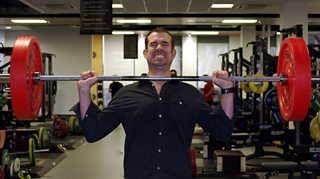How much weight should I lift in the gym?
For many of us, the weights end of the gym can be a bit intimidating. Strength training does have lots of benefits though – among other things, it’s good for balance, can help with joint pain, slows down muscle loss as we age, and can help us lose weight.

The problem is that there’s lots of conflicting advice about how much weight you should lift. Power lifters sometimes say: ‘go heavy or go home.’ While other advice suggests that lifting lighter weights is the key to toning up muscles. So should we go heavy or go light? Well some recent research suggests that it might not matter.
A 2016 study from the research group of Prof Stuart Phillips at McMaster University in Canada suggests that you can get the same benefits lifting lighter weights or heavier weights. At first this seems a bit counter intuitive – so how did they reach their conclusions?
The study split 49 weight trainers into two groups and started them on a 12-week weight training programme. For each participant, they calculated their ‘one-repetition maximum’ or 1RM – that’s the heaviest weight they can lift.
They then split the study into two groups, one group lifting 30-50% of their 1RM and the other group lifting 75-90%. The key thing was that each group lifted their weights to ‘volitional failure’ – in other words, they lifted until they couldn’t lift any more.
‘Failure’ will happen to anyone and everyone, however strong, if they do enough repetitions. So the group lifting the lighter weights did a larger number of reps (20-25) than the group lifting the heavier weight (8-12).
The theory behind muscle failure is to do with ‘motor units.’ Motor units are bundles of muscle fibres controlled by a nerve. When you lift a weight, motor units will be required to contract the muscle. With each lift, some motor units will get fatigued, so additional motor units need to be used to do the next lift. Sooner or later you get to a point where all your available motor units have been exhausted – that’s what causes your muscles to fail.
In the McMaster study, the results showed that despite lifting different weights, both groups showed the same increase in strength and muscle growth. In other words, doing heavy weights with fewer reps or lighter weights with more reps made no difference. These results agreed with earlier research conducted by the same group.
So what does that mean for the rest of us? Well, it means that you can get results lifting heavy weights OR lighter weights, so long as you’re pushing your muscles to work harder than they normally do. You don’t always need to lift to failure to get results – but your muscles need to be ‘overloaded’ compared to your normal day to day life. Strength and conditioning coach Richard Blagrove from St. Mary’s University, Twickenham, suggests that on a scale of 1 to 10, where 10 is repetition failure, lifting to 7 or 8 is about right.
If your muscles are feeling that overload once a week, your body will adapt and get stronger. If you want to continue to get stronger, you will need to constantly re-assess and progress your weight or rep level, to make sure you are always pushing your muscles beyond their comfort zone. If your weight training feels easy, it probably isn’t doing anything for you.
You can get results using weights machines or free weights. Free weights also force you to use stabiliser muscles meaning you use more energy, and your joints move in their most natural way. But it’s important to lift correctly, so as soon as your “form” starts to go, you should probably stop. If you DO want to push yourself to failure, weight machines might be the safest place to do it. If you lift to failure with free-weights you need a partner who can relieve you of the weight when you can no longer lift it.
The most important thing is that you have a weight programme that is safe, so seek qualified instruction before you start for the first time. But unless you want to be a powerlifter or bodybuilder, don’t fret over weights vs reps. The important thing for building strength and muscle is to get to the gym regularly, and push yourself out of your comfort zone.
















































